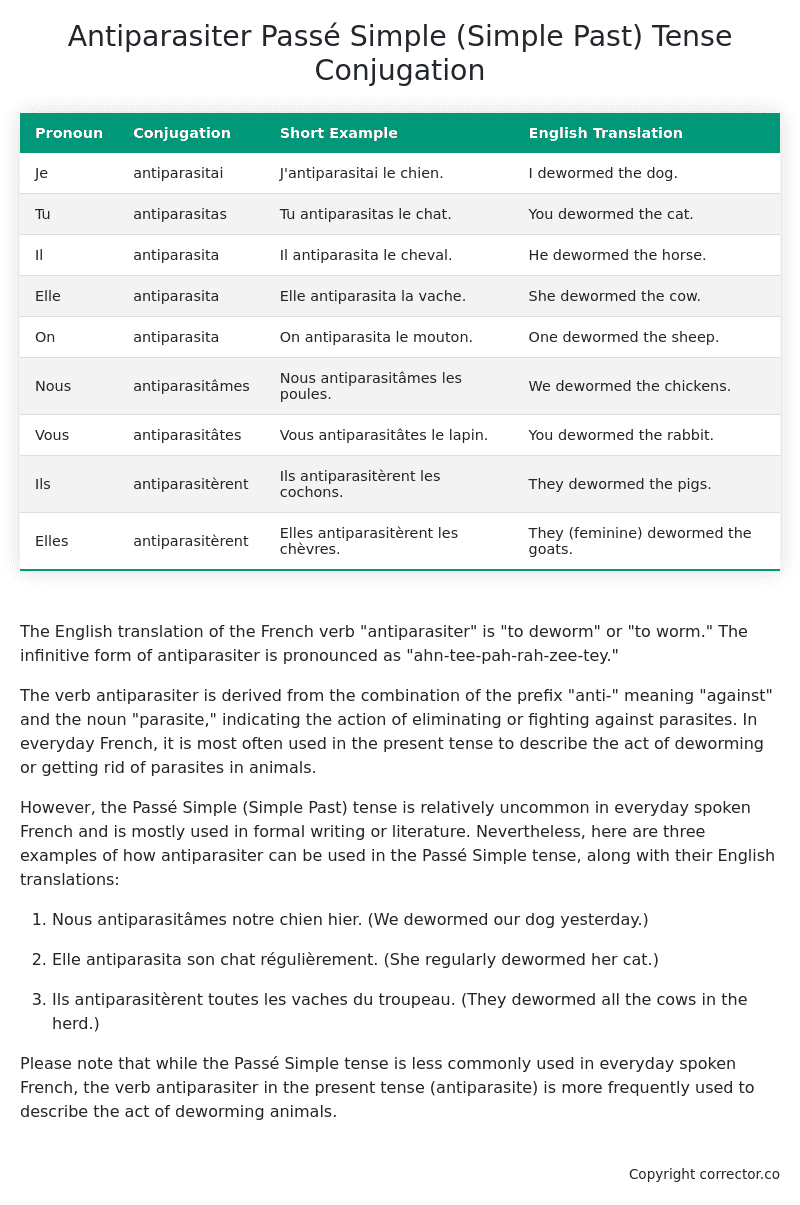Passé Simple (Simple Past) Tense Conjugation of the French Verb antiparasiter
Introduction to the verb antiparasiter
The English translation of the French verb “antiparasiter” is “to deworm” or “to worm.” The infinitive form of antiparasiter is pronounced as “ahn-tee-pah-rah-zee-tey.”
The verb antiparasiter is derived from the combination of the prefix “anti-” meaning “against” and the noun “parasite,” indicating the action of eliminating or fighting against parasites. In everyday French, it is most often used in the present tense to describe the act of deworming or getting rid of parasites in animals.
However, the Passé Simple (Simple Past) tense is relatively uncommon in everyday spoken French and is mostly used in formal writing or literature. Nevertheless, here are three examples of how antiparasiter can be used in the Passé Simple tense, along with their English translations:
-
Nous antiparasitâmes notre chien hier.
(We dewormed our dog yesterday.) -
Elle antiparasita son chat régulièrement.
(She regularly dewormed her cat.) -
Ils antiparasitèrent toutes les vaches du troupeau.
(They dewormed all the cows in the herd.)
Please note that while the Passé Simple tense is less commonly used in everyday spoken French, the verb antiparasiter in the present tense (antiparasite) is more frequently used to describe the act of deworming animals.
Table of the Passé Simple (Simple Past) Tense Conjugation of antiparasiter
| Pronoun | Conjugation | Short Example | English Translation |
|---|---|---|---|
| Je | antiparasitai | J’antiparasitai le chien. | I dewormed the dog. |
| Tu | antiparasitas | Tu antiparasitas le chat. | You dewormed the cat. |
| Il | antiparasita | Il antiparasita le cheval. | He dewormed the horse. |
| Elle | antiparasita | Elle antiparasita la vache. | She dewormed the cow. |
| On | antiparasita | On antiparasita le mouton. | One dewormed the sheep. |
| Nous | antiparasitâmes | Nous antiparasitâmes les poules. | We dewormed the chickens. |
| Vous | antiparasitâtes | Vous antiparasitâtes le lapin. | You dewormed the rabbit. |
| Ils | antiparasitèrent | Ils antiparasitèrent les cochons. | They dewormed the pigs. |
| Elles | antiparasitèrent | Elles antiparasitèrent les chèvres. | They (feminine) dewormed the goats. |
Other Conjugations for Antiparasiter.
Le Present (Present Tense) Conjugation of the French Verb antiparasiter
Imparfait (Imperfect) Tense Conjugation of the French Verb antiparasiter
Passé Simple (Simple Past) Tense Conjugation of the French Verb antiparasiter (You’re reading it right now!)
Passé Composé (Present Perfect) Tense Conjugation of the French Verb antiparasiter
Futur Simple (Simple Future) Tense Conjugation of the French Verb antiparasiter
Futur Proche (Near Future) Tense Conjugation of the French Verb antiparasiter
Plus-que-parfait (Pluperfect) Tense Conjugation of the French Verb antiparasiter
Passé Antérieur (Past Anterior) Tense Conjugation of the French Verb antiparasiter
Futur Antérieur (Future Anterior) Tense Conjugation of the French Verb antiparasiter
Subjonctif Présent (Subjunctive Present) Tense Conjugation of the French Verb antiparasiter
Subjonctif Passé (Subjunctive Past) Tense Conjugation of the French Verb antiparasiter
Subjonctif Imparfait (Subjunctive Imperfect) Tense Conjugation of the French Verb antiparasiter
Conditionnel Présent (Conditional Present) Tense Conjugation of the French Verb antiparasiter
Conditionnel Passé (Conditional Past) Tense Conjugation of the French Verb antiparasiter
Conditionnel Passé II (Conditional Past II) Tense Conjugation of the French Verb antiparasiter
L’impératif Présent (Imperative Present) Tense Conjugation of the French Verb antiparasiter
L’impératif Passé (Imperative Past) Tense Conjugation of the French Verb antiparasiter
L’infinitif Présent (Infinitive Present) Tense Conjugation of the French Verb antiparasiter
L’infinitif Passé (Infinitive Past) Tense Conjugation of the French Verb antiparasiter
Le Participe Présent (Present Participle) Tense Conjugation of the French Verb antiparasiter
Le Participe Passé (Past Participle) Tense Conjugation of the French Verb antiparasiter
Struggling with French verbs or the language in general? Why not use our free French Grammar Checker – no registration required!
Get a FREE Download Study Sheet of this Conjugation 🔥
Simply right click the image below, click “save image” and get your free reference for the antiparasiter Passé Simple tense conjugation!

Antiparasiter – About the French Passé Simple (Simple Past) Tense
Formation
Usage
Narration
Historical Context
Interactions with other tenses
Passé Composé
Imparfait
Conditional and Subjunctive
Summary
I hope you enjoyed this article on the verb antiparasiter. Still in a learning mood? Check out another TOTALLY random French verb conjugation!


